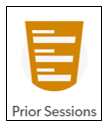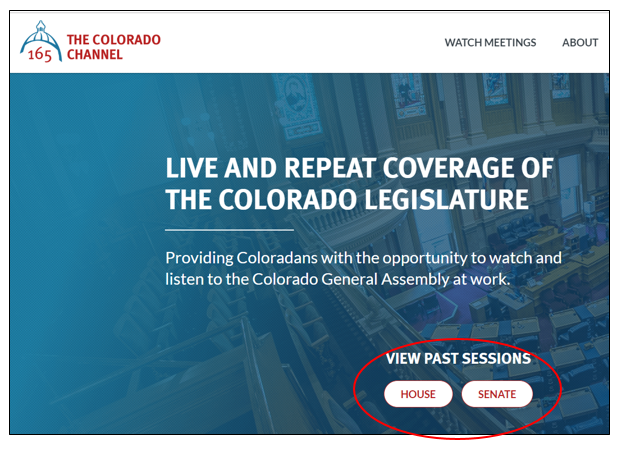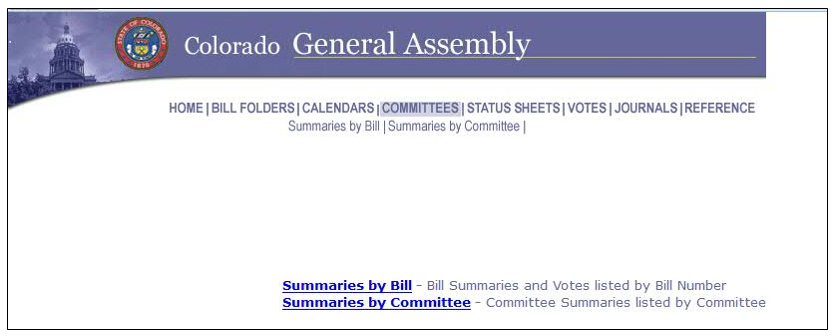Editor’s note: This article was originally posted December 10, 2015. It has been updated for the 2020 Legislative Session.
by Julie Pelegrin
As legislators, lobbyists, and stakeholders are working through this session’s bills, many may wonder, “Is this really a new idea, or has someone tried this before?” Or maybe someone’s looking to strengthen an existing statute and wondering, “When did they first pass this statute, and has it always had these problems?” The answers to these questions are easily found with just a bit of research. The key is knowing where to look.
Bill Title Histories
Every bill introduced in every regular and special legislative session since 1997 is available on the General Assembly’s website under the “Bills” tab. For 2016 to the present session, use the search box in the blue bar to search for a bill by the bill number, sponsor name, or keywords. If you’re not looking for a specific bill, you can also take a look at the bills that are sparking the most interest in the “Most Accessed Bills” box.
Or you can look at groups of bills by general subject area in the “Browse by Subject” box. Only bills from the current or most recent session will appear from the initial search, but you can use the new search box that appears above your search results to find bills from a different year by subject area, going back to 2016:
In the “Session” box you can use the arrow menu to choose “All” to create a list of bills from 2016 to the present in one search.
 For bill information from legislative sessions before 2016, click on “Prior Sessions” in the “BILLS” pull down menu at the top of the page or click on the “Prior Sessions” icon toward the bottom of the “Bills” page.
For bill information from legislative sessions before 2016, click on “Prior Sessions” in the “BILLS” pull down menu at the top of the page or click on the “Prior Sessions” icon toward the bottom of the “Bills” page.
The bills are organized by year, and the database of each year’s bills is searchable.
Once you choose the year you wish to search, you can search for a keyword or phrase by clicking “Search” near the top of the page. A legislator may also ask an Office of Legislative Legal Services (OLLS) drafter to search the OLLS database of bill and resolution titles, which goes back to 1999. This search identifies bills and resolutions that included a particular term or phrase in their titles.
A legislator may also ask an Office of Legislative Legal Services (OLLS) drafter to search the OLLS database of bill and resolution titles, which goes back to 1999. This search identifies bills and resolutions that included a particular term or phrase in their titles.
Legislative History
Just knowing whether a bill has been introduced to address your topic is not enough. It’s also helpful to know how the bill was amended, who testified for or against it, what issues were debated, and whether the bill passed. This information is also available, but it may take a bit of digging.
For bills introduced from 2016 to the present, once you find the bill you wish to research, use the bar below the “Status” bar to access:
- “Bill Text” – all versions of the bill;
- “Fiscal” – all versions of the fiscal note written for the bill;
- “Committees” – all of the committee reports on the bill, including the vote tallies for each report;
- “Votes” – House and Senate floor votes on the bill;
- “Amendments” – any amendments offered and whether the amendment passed (only available for bills starting in 2019); and
- “Bill History” – the history of the bill, which lists the committees the bill was assigned to, each action taken on the bill, and the date of each action.
For prior session bills (1997 to 2015), once you find the bill you wish to research, click on the designated links to access:
- All versions of the bill;
- The history of the bill, which lists the committees the bill was assigned to, each action taken on the bill, and the date of each action;
- All versions of the fiscal note written for the bill;
- All of the committee reports on the bill, including the vote tallies for each report; and
- The third reading vote tallies for the bill. When you click on the third reading vote link, it takes you to the House or Senate Journal page for the day on which the House or Senate voted on the bill on third reading. You can use “Control F” on your keyboard to search for a bill number or scroll through the journal pages until you find the bill you are researching.
- To find a summary of a committee hearing on a bill, click on “Committees” at the top of the page. Next, click on “Summaries by Bill,” then select your bill, and you will see the bill summaries for each committee of reference that heard the bill. Click on the arrow next to the committee name to get to the committee’s documents. Click on “Bill Summary,” and you will see a short summary of the bill discussion, any testimony provided on the bill, any amendments offered, the vote tally on each amendment, and the final vote tally on the bill.
Each bill summary also shows the date of the committee hearing and the times at which the bill sponsor spoke, witnesses testified, and the committee took action on the bill. This is important information if you want to listen to the testimony or debate. The state has recordings of committee hearings going back to 1973. The General Assembly website has digital audio recordings of committee hearings from 2011 to the present available on its “Watch & Listen” page. To listen to an audio recording of a committee hearing held before 2011, you must contact state archives.
You may also be able to watch or listen to the floor debate on a bill. Use the bill history to identify the date on which a bill was considered on  second or third reading. Then, on the General Assembly homepage, click “Watch & Listen” in the top right corner of the page. Then click on the “Go To Colorado Channel” home page link, choose “House” or “Senate” under the “View Past Sessions” option, then scroll down to the year tabs or scroll down to the bottom of the page and click on the “View More” option. Click on the year and session date you want. To the right of the date there are links to that legislative date’s calendar and journal entry. Video and audio recordings of floor sessions go back to the 2008 session. To listen to floor sessions prior to 2008, you must contact state archives. You will need to be able to provide their staff with a bill number or desired dates of recordings. In addition, there may be a fee for record requests prepared by state archives staff.
second or third reading. Then, on the General Assembly homepage, click “Watch & Listen” in the top right corner of the page. Then click on the “Go To Colorado Channel” home page link, choose “House” or “Senate” under the “View Past Sessions” option, then scroll down to the year tabs or scroll down to the bottom of the page and click on the “View More” option. Click on the year and session date you want. To the right of the date there are links to that legislative date’s calendar and journal entry. Video and audio recordings of floor sessions go back to the 2008 session. To listen to floor sessions prior to 2008, you must contact state archives. You will need to be able to provide their staff with a bill number or desired dates of recordings. In addition, there may be a fee for record requests prepared by state archives staff.
Source Notes
If you want to know when a statute was originally enacted and how it has been changed since then, you must check the statute’s source note.
Every section of the Colorado Revised Statutes has a source note immediately following its text that indicates the year the section was added, any year in which it was changed, which provision of the section was changed, where in the Session Laws to find the bill that made the change, and the effective date of the change. For more of the specifics on interpreting source notes, see page vi at the beginning of each printed volume of the Colorado Revised Statutes or check out this memo on the OLLS home page. There’s also a very handy chart for decoding source notes.
If the source note tells you that your section has been amended, use the reference to the Session Laws to look up the bill that amended the section. For example, if the source note says “L. 2019: (6.5) amended, (HB19-1014) ch. 11, p. 42, §1, effective January 20, 2020,” open the 2019 Session Laws of the State of Colorado to page 42 and you’ll find the bill that amended the section. Online, go to the “LAWS” tab and choose “Session Laws”. On the new page choose the “2019 Regular Session” view and click on the PDF link to the right of the appropriate bill or chapter number. Source notes have included the number of the bill adding, amending, or repealing a statute since 2009. For source note information prior to 2009, you’ll need to use the listed chapter or page number to find the bill or statute in the Session Laws. In the online Session Laws from 2016 to present, clicking on the “Bill Topic” listing on a bill will link you back to the bill’s information page, which includes the different versions of the bill and its history of passage.
For Session Laws from 1993 to 2015, click on the “Session Laws Prior to 2016” link. At the bottom of the list of Session Laws, there is a link to the University of Colorado’s William A. Wise Law Library, which provides digital access to the 1861 to 1992 Session Laws.
See also “Do It Right – Researching Legislative History: What to Look For and Where to Find It”, posted March 22, 2012.







